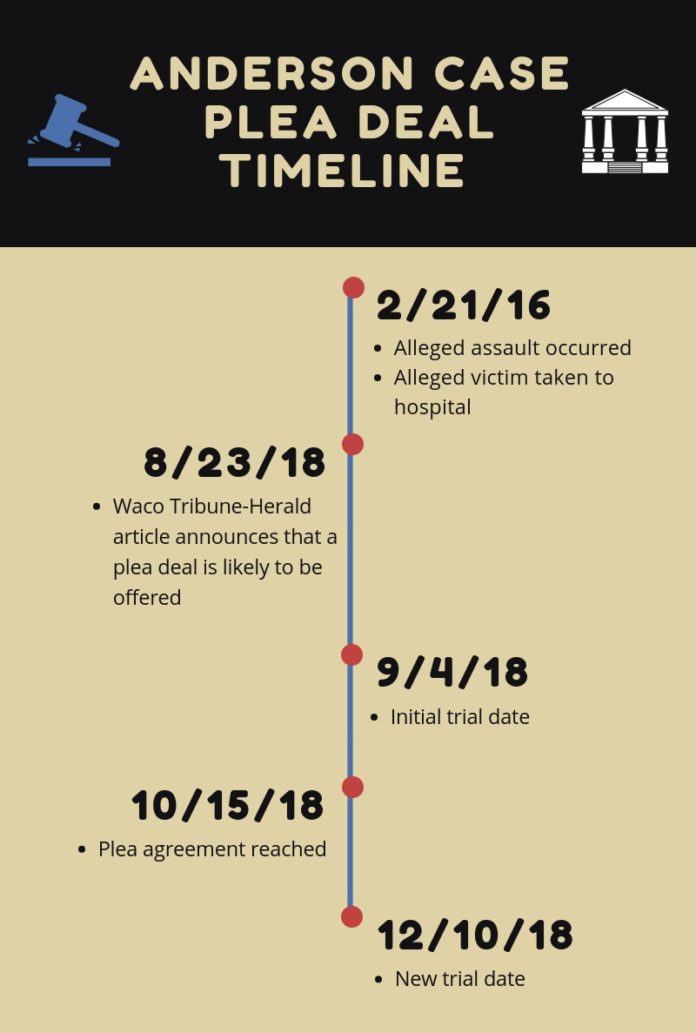
By Lizzie Thomas | Staff Writer
District 19 Judge Ralph Strother will decide Dec. 10 whether he will accept a plea bargain by Jacob Walter Anderson, former president of the Baylor fraternity Phi Delta Theta. The date for the decision was pushed back after the victim filed a formal objection to the plea bargain.
Robert Callahan, a local defense attorney, said he heard the alleged victim had filed an objection but he has never before seen a formal objection to a plea deal filed. He was surprised to see that the victim had formally moved to postpone the judge’s decision on the plea bargain, which was successful.
“Whenever a DA recommends a plea offer, the defendant has to decide whether to accept it or not. Once the plea is explained and accepted, the judge has to determine if he’ll accept the offer,” Callahan said. “The judge has the opportunity, if he feels it is appropriate, to reject or modify the plea agreement. If the judge does reject it, the defendant has the opportunity to withdraw the plea as though they never plead guilty.”
Callahan said judges rarely reject plea agreements, and he would speculate that, though it’s not uncommon, it happens every 50 or so pleas.
Anderson was charged with four counts of sexual assault in 2016 following accusations that lead to his departure from Baylor.
According to court documents, the case is currently in the pre-sentence investigation stage where the probation officers will tell the judge their recommendation based on what they find.
The plea bargain consists of deferring Anderson’s adjudication probation, deferring finding Anderson guilty for three years, paying $400 in fines, completing individual psychological treatment and alcohol and drug treatment and reducing Anderson’s sentence to unlawful restraint — for which he could get 10 years jail time — instead of four counts of sexual assault.
In the victim’s formal plea objection, the victim’s parents said the following in an email to legal counsel Vic Feazell:
“[We] are so upset!!!!! What is going on? Why are we reading that the DA is offering a plea less than sexual assault? This man raped our daughter four times and left her to die!!!! Hilary said she would not offer a plea! She is not answering! He should be charged with kidnapping and attempted murder and as much as can be added!”
In the victim’s formal objection, she voiced her concerns against the proposed plea bargain, “which would remove any allegation of sexual assault, guarantee probation and not require defendant to register as a sex offender.” She asked the court to either refuse to accept the plea bargain or postpone accepting the proposed plea bargain until she “had an opportunity to complete her victim impact statement and have it considered by the court prior to the plea bargain being accepted.”
The second motion was accepted: the decision on the plea was previously scheduled for Sept. 4 and is now set for Dec. 10. However, this was only a delay, not a rejection of the plea — which was her first motion.
Under Act 56.02. Crime Victims’ Rights, she has the right to complete the victim impact statement and have it considered before a plea bargain is accepted.
Los Angeles senior Callie Strull said she thought the case should go to trial, as the victim has requested.
“I think it sets a bad precedent,” Strull said. “I don’t want to say sometimes you need a scapegoat … but sometimes you need a scapegoat. He should not get away with so little — especially with everything that’s happened at Baylor anyway — or else it’ll tell people that’s okay.”
Brian Serr, a professor at the Baylor Law School, said there are factors related to these types of decisions that are not public.
“Without knowing all the relevant factors, meaningful predictions are impossible,” Serr said. “Also, one of my former students, an excellent prosecutor, has been dragged through the mud on this by several media outlets — media outlets that also lacked all the details that go into these difficult judgements.”
The prosecutor, Hillary LaBorde, has given various justifications for offering a plea bargain, but the public will not know all the facts until after the decision when the details of a pretrial investigation are released.





